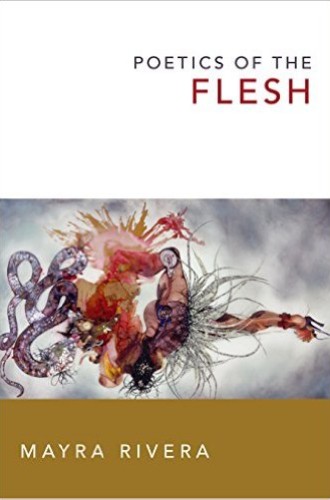Carnal theology
The Christian body has never been one,” writes Mayra Rivera. Those of us involved in ecumenical conversations, church committee meetings, or denominational politics of all kinds understand as much. But Rivera’s playful language here (likely riffing off of similar wordplay in the work of French theorist Luce Irigaray) signals more. The body is not one, in the flesh. What texts articulate theologically about corporeality, carnality, and incarnation is far from homogenous. And this multiplicity matters for our ecological, social, political lives.
Rivera, who teaches theology and Latina/o studies at Harvard, is known for her lively prose, her attention to the rhythms of ordinary lives, and her theological engagement with postcolonial theory. Her first book, The Touch of Transcendence: A Postcolonial Theology of God, reflected on difference, divinity, and relationality in an argument for what she called “relational transcendence.” She located a sense of glory in the everyday circulations of touch, flesh, and planetary creatures.
Read our latest issue or browse back issues.
In this new book, Rivera “elaborates a view of corporeality woven by its carnal relations to the world—spiritual, organic, social—describing folds of body and flesh, flesh and world, body and word.” She folds, unfolds, and refolds ideas while reading biblical and classical texts, critical theory, and contemporary reflections on materiality, gender, and race. Rivera’s work is richly philosophically and theologically complex, worth engagement, and demands an attentive reading. Its prose and poetics write “a stance toward knowledge, a style of writing, and the creative dimensions of thought.” In its creativity, this book defies genre and glimmers with beauty throughout.
Rivera doesn’t attempt a genealogy of Christian ideas of corporeality but instead attempts to “explore evolving relations between different interpretations.” This exploratory move yields one of the most important arguments in Rivera’s work: that there are two distinctive interpretations of “Christian flesh.” The first kind she calls somatic views, often inspired by the apostle Paul. Somatic views posit a division between “spiritual” and “carnal” bodies, privilege the spiritual, and “imagine bodies as less firmly attached to their flesh.” Devaluing carnal bodies for the sake of spiritual bodies, somatic views often imagine flesh as inherently sinful, something to be tamed, shaped, or subdued for the sake of a “pure” spiritual life. Somatic views often fall into dualism, spiritual escapism, and devaluation of physical, embodied experience.
Habits of reflection that fall into Rivera’s second category, carnal views, “tend to emphasize metaphors of flesh, carnal exchanges, and transformation.” Flesh is indeterminate, flows, exchanges fluids, changes over time, is consumed, transformed, and often becomes the reality of rich spiritual encounter. Rivera finds carnal views in the Gospel of John and the writing of Tertullian—texts that literarily reflect on the strange intermingling of flesh. Water and flesh and blood flow together, meals become flesh, and incarnate and risen bodies intermingle with the earth.
Affirming the messiness of flesh, Rivera rightly finds more possibilities in the carnal view because “Christian flesh is notoriously susceptible to metamorphosis.” Compassion for that capacity for every flux and becoming of flesh—toward the real vulnerabilities of our flesh together—might bring about more kinds of solidarities and embracing of the various differences in our earthy, carnal bodies.
Throughout the rest of the book, Rivera reflects on somatic and carnal views in their contemporary incarnations. She finds loves of the flesh and complications in the work of critical theorists like Maurice Merleau-Ponty, Michel Foucault, Irigaray, Judith Butler, and others. These views of flesh, she argues, have consequences in society and politics. They influence how we think about gender, race, and ecology.
Rivera’s carnal fugue culminates in the third part of the book. This is where her poetic writing style and conceptual power becomes clear. Ideas of corporeality materialize, becoming flesh in what she calls ambivalent incarnations. “Social discourses shape the world—not just represent it.” Navigating that labyrinth of social incarnations requires our attentive care to knowledge, practice, and politics.
Thinking with postcolonial theorists and poets like Frantz Fanon, Édouard Glissant, and Aimé Césaire, Rivera argues that “flesh carries histories—evolutionary and also social histories. The constitution of our flesh bears the mark of our personal lives. And our flesh carries traces of the histories of our communities.” Categories of race and sex, in their cultural effects, do mark and affect the flesh of real bodies. “They influence the implementation of laws, economic decisions, health and environmental policies, agricultural practices, zoning and construction regulations, the production of knowledge.”
Ideas of flesh, race, sex, human embodiment, and corporeality materially shape our bodies and carry our lives into the present. Attending to these configurations means examining the systemic injustices that create conditions of suffering for marginalized, scapegoated, and colonized bodies. Attending to these configurations also means thinking about the value of fleshy bodies, possibilities of resistance, and visions of a beautifully carnal hope.
The way we think about incarnation matters for loving our incarnate neighbors and the earth that constitutes us. Rivera’s book is a poetic love song of our incarnate life. It’s a song I’ll gladly sing.







